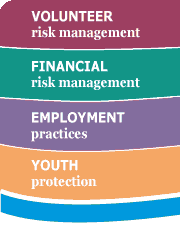Investing in Bonds
In his book Bowling Alone: The Collapse and Revival of American Community, author Robert D. Putnam finds that participation in American civic and social life has been dropping steadily. He became curious about this trend when a friend of his who owned a bowling alley complained that years ago, thousands of people bowled in leagues. Today, they are more likely to bowl alone or with small family groups. This, it turns out, is very bad for the bowling business since leaguers tend to eat more and drink more beer.
As Putnam began exploring he found that this trend went far beyond bowling. His conclusion,
"Television, two-career families, suburban sprawl, generational changes in values — these and other changes in American society have meant that fewer and fewer of us find that the League of Women Voters, or the United Way, or the Shriners, or the monthly bridge club, or even a Sunday picnic with friends fits the way we have come to live. Our growing social-capital deficit threatens educational performance, safe neighborhoods, equitable tax collection, democratic responsiveness, everyday honesty, and even our health and happiness."
In other words, a sense of belonging to a community just may be the building block on which all of civilization depends. Yet it is just this foundation that is eroding.
Nonprofit organizations like yours are about making connections between people, offering others a hand up, drawing people inside the circle, in other words, building community. It is an important calling and one that perhaps deserves more respect than it consistently gets.
We have been thinking about communities as we redesign the Center's web site. One way of conceptualizing a community is by the various inter-related functions that a community offers: education, commerce, health care, information, communication, and recreation. The Center's web site is a virtual risk management community that offers opportunities for you to come into contact with all of these functions. We hope that you will visit — and become part of — our online community soon.
In our nation's early history, communities tended to be defined by geographical boundaries. Today, communities are defined less by geography and more by occupational, religious, and cultural similarities. The Internet has created on-line communities made up of folks who may never meet face-to-face but share some common interest. And while the nature of communities has changed, one fact stands immutable: each of us has a finite amount of time for which several communities are competing. Participating in one community by necessity means restricting time in another.
This fact has real risk management implications for organizations that rely upon volunteers to accomplish their missions. It is so easy to be waylaid on the path, to focus on achievement for its own sake and forget our real purpose. Don't let that happen. Continue working to build a spiritual sense of community where you live and where you work. Don't allow yourself to get so mired in the muck of the day-to-day tug of war that you forget the purpose of your organization. Service is never about how many pieces you mail, how fast your computers go or how much money you raise. Service is about building community and community is relationships between people. Those bonds, after all, are the real treasures of life.
© 2003 Nonprofit Risk Management Center






